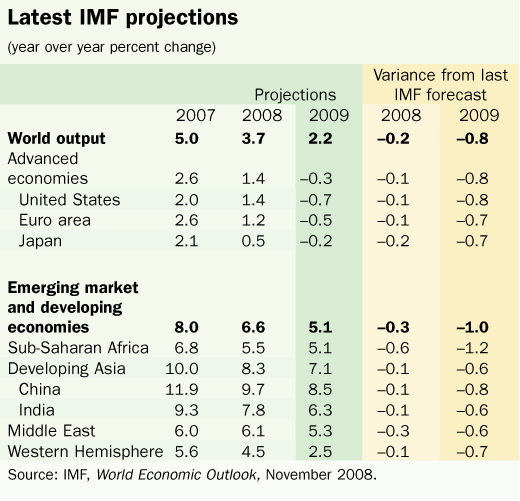
Typical street scene in Santa Ana, El Salvador. (Photo: iStock)
IMF Survey: IMF Urges Stimulus as Global Growth Marked Down Sharply
November 6, 2008
- IMF forecast cuts world growth by ¾ percentage point to 2.2 percent for 2009
- IMF says policies to stimulate growth can help cushion downturn
- Forecast published ahead of G-20 meeting on global crisis
The IMF is urging countries to stimulate their economies in the face of a bigger-than-expected slowdown in the global economy triggered by recent financial turmoil.

Global economic activity is slowing quickly amid deepening financial stress, the IMF says in its latest world forecast (photo: Paulo Whitaker/Reuters)
WORLD ECONOMIC OUTLOOK UPDATE
In its latest forecast for world economic growth, the IMF sharply revised its growth projections downward, saying that "global activity is slowing quickly."
"Prospects for global growth have deteriorated over the past month, as financial sector deleveraging has continued and producer and consumer confidence have fallen," the IMF said in its updated World Economic Outlook (WEO), published on November 6.
It said that world output is projected to expand by 2.2 percent in 2009, down by some ¾ percentage point of GDP relative to the projections in the October WEO. In advanced economies, output is forecast to contract on a full-year basis in 2009, the first such fall in the postwar period. In emerging economies, growth is projected to slow appreciably but still reach 5 percent in 2009.
But the IMF noted that these projections were based on currently announced policies, and advocated further policy actions to sustain demand. "Global action to support financial markets and provide further fiscal stimulus and monetary easing can help limit the decline in world growth," the outlook, published ahead of meetings of the Group of Twenty industrial and emerging economies, said.
IMF Chief Economist Olivier Blanchard told a news conference: "We think that global fiscal expansion is very much needed at this point. If it comes, then the forecast we have will be on the pessimistic side."
Washington summit
Finance ministers will meet November 8-9 in Sao Paolo, Brazil, ahead of a summit of world leaders in Washington on November 15 to discuss issues related to the crisis. The IMF, which will also attend, has been asked to take the lead by its policy-setting body, the International Monetary and Financial Committee, in line with its mandate, in drawing the necessary policy lessons from the current crisis and recommending effective actions to restore confidence and stability. These ideas could feed into the summit discussion.
The White House has invited to the summit members of the G-20, a forum of rich and emerging nations that was convened in 1999 after an earlier international crisis. Its members are Argentina, Australia, Brazil, Britain, Canada, China, France, Germany, India, Indonesia, Italy, Japan, South Korea, Mexico, Russia, Saudi Arabia, South Africa, Turkey, the United States, and the European Union.
Blanchard said the IMF would "advocate at the G-20 a global fiscal expansion as one of the measures that has to be taken fairly soon." Jorg Decressin, of the IMF's Research Department, told the news conference that the United States, Germany, and China were among the countries that have room for additional fiscal stimulus.
Global activity slowing quickly
The IMF said that world growth is projected to slow from 5 percent in 2007 to 3¾ percent in 2008 and to just over 2 percent in 2009, with the downturn led by advanced economies (see chart).

• Activity in the advanced economies is now expected to contract by ¼ percent on an annual basis in 2009, down ¾ percentage points from the October 2008 WEO projections. This would be the first annual contraction during the postwar period, although the downturn is broadly comparable in magnitude to those that occurred in 1975 and 1982. A recovery is projected to begin late in 2009. The U.S. economy will suffer, as households respond to depreciating real and financial assets and tightening financial conditions. Growth in the euro area will be hard hit by tightening financial conditions and falling confidence. In Japan, the support to growth from net exports is expected to decline.
• The downward revisions to 2009 real GDP growth projections are somewhat larger in emerging and developing economies, averaging 1 percent. This would leave their growth rate at 5 percent, higher than in earlier business cycle troughs (for example, in 1990, 1998, and 2001). However, the cyclical downturn in emerging economies is of a similar magnitude to that in the advanced economies when measured relative to higher trend growth rates, in line with past cycles. Downward revisions vary considerably across regions. Among the most affected are commodity exporters, given that commodity price projections have been marked down sharply, and countries with acute external financing and liquidity problems. Countries in East Asia—including China—generally have suffered smaller markdowns, because their financial situations are typically more robust, they have benefited from improved terms of trade from falling commodity prices, and they have already initiated a shift toward macroeconomic policy easing.
Reduced inflationary pressures
The forecast said that a combination of stabilizing commodity prices and increasing economic slack will help to contain inflation pressures.
In the advanced economies, headline inflation should decline to below 1½ percent by the end of 2009. In emerging economies, inflation is also expected to moderate, albeit more gradually. However, in a number of these countries, inflation risks are still manifest, as higher commodity prices and continued pressure on local supply conditions have affected wage demands and inflation expectations.
Limiting the damage
Comprehensive policy actions are being implemented to address the root causes of financial stress and to support demand, but it will take time to reap their full benefits. The initiatives include programs to purchase distressed assets, use of public funds to recapitalize banks and provide comprehensive guarantees, and a coordinated reduction in policy rates by major central banks.
The IMF forecast said that a stronger macroeconomic policy response to the crisis could help limit the damage. "There is a clear need for additional macroeconomic policy stimulus relative to what has been announced thus far, to support growth and provide a context to restore health to financial sectors. Room to ease monetary policy should be exploited, especially now that inflation concerns have moderated," it stated.
But the forecast said that monetary policy easing may not be enough. "Fiscal stimulus can be effective if it is well targeted, supported by accommodative monetary policy, and implemented in countries that have fiscal space."
Cross-border consistency
The IMF said that policies need to be coordinated across borders. "Crucially, there must be better cross-border consistency of policies," the forecast said.
"A key task will be to develop cooperative arrangements for the resolution of large cross-border institutions where none currently exist, given the limitations of individual country frameworks. Moreover, the extension of financial support and guarantees must consider potential cross-border effects, including for emerging economies. Finally, exit strategies for the public sector from financial system ownership need to be developed."
Comments on this article should be sent to imfsurvey@imf.org


